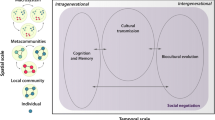Abstract
The “return” of ethnobiological investigations to the communities involved in the data collection has been a recurring theme on the world stage. In this chapter, we present a brief discussion on this subject. Rather than trying to indicate certain paths, the idea of this chapter is to provoke a discussion on the subject. We will address proposals for the “return” of research that are divided into actions that do not depend on third parties and actions that necessarily depend on support from organizations and/or institutions, especially those involved in research and development.
Access this chapter
Tax calculation will be finalised at checkout
Purchases are for personal use only
Similar content being viewed by others
References
Shanley P, Laird SA (2002) “Devolviendo”: hacienda que los resultados de la investigación sean relevantes para los grupos locales y para la conservación. In: Laird SA (ed) Biodiversidad y conocimiento tradicional: paticipación equitativa en práctica. Editorial Nordan-Comunidad, Uruguay
Albuquerque UP (2005) Introdução à etnobotânica, 2ª. ed. Interciência, Rio de Janeiro
Bridges KW (2004) Editorial: give and take. Ethnobot Res Appl 2:75
Schmidt P, Santos JL (2002) Avaliação de ativos intangíveis. Atlas, São Paulo
Brasil INPI Instrução Normativa N 12 de 16/03/2013. Estabelece as condições para o registro das indicações geográficas
Brito MR (2010) Comunidade caiçara da praia do Sono, Paraty, RJ, Brasil, uso dos recursos vegetais. Dissertation, Museu Nacional-Universidade Federal do Rio de Janeiro
Boscolo OH (2011) Estudos etnobotânicos em área de Mata Atlântica nas comunidades de Galdinópolis e Rio Bonito, Nova Friburgo, RJ, Brasil. Thesis, Museu Nacional-Universidade Federal do Rio de Janeiro
Fonseca-Kruel VS, Peixoto AL, Sá CFC, Araújo DSD, Silva WL, Ferreira AJ (2006) Plantas úteis da restinga: o saber dos pescadores artesanais de Arraial do Cabo, Rio de Janeiro. Instituto de Pesquisas Jardim Botânico do Rio de Janeiro, Rio de Janeiro
Alexiades M, Huajohuajo G, Huajohuajo M, Mamío R, Peluso D, Quiosche R, Pesha V, Tirina G (2005) Ejjabahuejjaquijji ebiojonesqui shemeño Esse ejjaja esohuijo—Para conocer los remedios del monte. Federación Nativa del Rio Madre de Dios y Afluentes, Puerto Maldonado
Rios M, Martins-da-Silva RCV, Sabogal C, Martins J, Silva RN, Brito RR, Brito IM, Brito MFC, Silva JR, Ribeiro RT (2001) Benefícios das plantas da capoeira para a comunidade de Benjamin Constant, Pará, Amazônia brasileira. CIFOR, Belém
Hanazaki N, Peroni N, Araújo LG, Toledo BA, Tamashiro JY, Begossi A (2007) Etnobotânica Caiçara no litoral paulista. RiMa, São Carlos
Sen A (2000) Desenvolvimento como liberdade. Companhia das Letras, São Paulo
Freire P (2004) Pedagogia da Autonomia. Saberes necessários à prática educativa. Paz e Terra, São Paulo
Víctora CG, Knauth DR, Hassen MNA (2000) Pesquisa qualitativa em saúde—uma introdução ao tema. Tomo Editorial, Porto Alegre
Author information
Authors and Affiliations
Editor information
Editors and Affiliations
Rights and permissions
Copyright information
© 2014 Springer Science+Business Media New York
About this protocol
Cite this protocol
Albuquerque, U.P., de Sousa Araújo, T.A., Soldati, G.T., Fernandes, L.R.R.M.V. (2014). “Returning” Ethnobiological Research to the Communities. In: Albuquerque, U., Cruz da Cunha, L., de Lucena, R., Alves, R. (eds) Methods and Techniques in Ethnobiology and Ethnoecology. Springer Protocols Handbooks. Humana Press, New York, NY. https://doi.org/10.1007/978-1-4614-8636-7_28
Download citation
DOI: https://doi.org/10.1007/978-1-4614-8636-7_28
Published:
Publisher Name: Humana Press, New York, NY
Print ISBN: 978-1-4614-8635-0
Online ISBN: 978-1-4614-8636-7
eBook Packages: Springer Protocols




